Free Grace Theology is exciting. It clarifies the freeness of salvation, and in doing that, it clarifies other areas of theology, too. The Free Grace movement involves a reformation of more than one area of theology.
For example, did you know that the NT places spiritual growth squarely within the ekklēsia—the believing community? As Paul said:
And He Himself gave some to be apostles, some prophets, some evangelists, and some pastors and teachers, for the equipping of the saints for the work of ministry, for the edifying of the body of Christ (Eph 4:11-12).
According to Paul, who does the work of ministry?
The saints.
That means you.
Jesus gave apostles, prophets, evangelists, pastors, and teachers to equip the saints to do ministry. That means you cannot grow alone. Other people in the church must equip you.
And then, according to Paul, how is the body of Christ edified?
The body grows as the saints do the ministry for which they are equipped. Everyone has his or her part to play in the local church—everyone is called to minister. That is not a new insight but has been noted by many theologians and scholars. For example, Emil Brunner, in his study of the NT church, said:
One thing is supremely important: that all minister, and that nowhere is to be perceived a separation or even merely a distinction made between those who do and those who do not minister, between the active and the passive members of the body, between those who give and those who receive. There exists in the Ecclesia a universal duty and right of service, a universal readiness to serve and at the same time the greatest possible differentiation of functions (Emil Brunner, The Misunderstanding of the Church, p. 50).
If you are not equipped or allowed to do ministry, you will not grow, and the body will not be edified.
How do grace people grow spiritually? Together.


